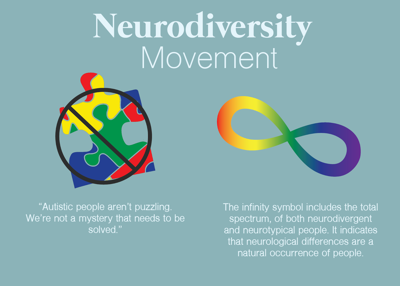April was Autism Awareness Month, but not everyone in the UA autistic community was celebrating. Several students with and without autism felt frustrated and hurt by some campus organizations’ official messaging around the common neurodivergence.
Jamie Anderson, a freshman with autism, arranged a meeting with Taylor Gathings, a sophomore and DEI administrative assistant, to discuss the Office of Diversity and Inclusion’s treatment of Autism Awareness Month. While scrolling through Instagram one day, Anderson noticed that someone operating the office’s account (@uark4inclusion) had posted an image using the puzzle piece symbol and promoting Autism Speaks, she said.
Many individuals with autism consider the nonprofit organization to be ableist and hateful, with its messaging often referencing autism as a problem to be fixed rather than a difference to be celebrated. The puzzle piece is no longer accepted by most in the autistic community as a symbol of autism, because it represents the idea that autism is a puzzle that needs to be solved, Anderson said.
“Autistic people aren’t puzzling,” Anderson said. “We’re not a mystery that needs to be solved. We’re just as complex as everybody else. We’re just a different neurotype.”
During her meeting with Gathings, Anderson discussed misconceptions about autism and ways to remedy the issues raised by the puzzle piece post, she said. Gathings removed the post and posted an Instagram story apologizing for the prior lack of understanding.
“I don’t think (this situation) was intentional,” said Sophia Joan, a graduate student with autism.. “I think it was just the state of autism awareness rather than autism acceptance or inclusivity.”
Anderson has a second meeting scheduled with staff in the DEI office this month to discuss further steps that could be taken outside of AAM to address misinformation or damaging practices surrounding autism on campus.
“It just made me really happy,” Anderson said. “I was amazed that somebody cared, because I see a lot of these issues pushed aside. So many people don’t know this is a problem because, why would you think about it if it doesn’t hurt you at all?”
The staff of the DEI office appreciates and welcomes opportunities for members of the UA community to think and plan together, Yvette Murphy-Erby, vice chancellor for diversity, equity and inclusion, said in an email. The office’s goal is to move campus forward in ways that advance the UofA’s purported priority of creating a diverse, equitable, and inclusive culture and climate, and meeting such a goal requires community cooperation, Murphy-Erby said.
Some students took the opportunity presented by AAM to draw attention to perceived problems with the UA Autism Support Program, which is designed to help students with autism succeed on campus. The program costs $5,000 a semester, requires an application process and only allows 15 members per year, according to the College of Education and Health Professions.
Instead of creating a different, cheaper autism support program, Joan thinks university administrators should focus on strengthening the Center for Educational Access through increased funding and prioritization, she said.
“(Students with autism are) not being held away from the public, we have a voice, we have the abilities to do this,” Joan said. “Instead of holding us separately and saying ‘Oh it’s fine. They’re being treated equally,’ make it true by bringing us together.”
Joan thinks disability rights are civil rights, and moving beyond autism awareness and toward promoting acceptance would help foster a more inclusive campus environment, she said.
“I think we’re at a point society-wise where we can push a lot of these issues forward and actually make something happen because, until very recently, autistic people were not taken seriously,” Anderson said. “And a lot of the time, we still aren’t.”
The UofA strives to promote an inclusive and diverse culture as part of its core mission, John Thomas, manager of university communications, said in an email.
“The university and various units across campus invest in many programs to help support our students, faculty and staff, including efforts to help increase engagement, understanding and a greater sense of belonging so that all the members of our campus community know they matter,” Thomas said.


(0) comments
Welcome to the discussion.
Log In
Keep it Clean. Please avoid obscene, vulgar, lewd, racist or sexually-oriented language.
PLEASE TURN OFF YOUR CAPS LOCK.
Don't Threaten. Threats of harming another person will not be tolerated.
Be Truthful. Don't knowingly lie about anyone or anything.
Be Nice. No racism, sexism or any sort of -ism that is degrading to another person.
Be Proactive. Use the 'Report' link on each comment to let us know of abusive posts.
Share with Us. We'd love to hear eyewitness accounts, the history behind an article.